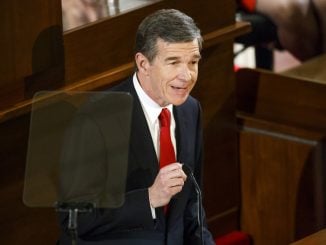RALEIGH — The proposed $27.9 billion budget was passed with heavy bipartisan support in both legislative chambers.
After a series of conference reports between the House and Senate, on July 1 the measure passed the House by a vote of 82-25 and a vote of 36-8 in the Senate. The 2022 Appropriations Act was sent to Gov. Roy Cooper the same day. It is not clear as of press time Tuesday evening if he intends to sign it or add to the record 71 vetoes he has issued during his tenure to date.
House Bill 103, the 2022 Appropriations Act, is a revision of the previous two-year budget passed in 2021. The revisions bring net appropriations from the previous fiscal year up by 7.2%.
“This is a good budget that keeps North Carolina on the same path of conservative spending that has put us on good footing ahead of a possible recession,” House Speaker Tim Moore (R-Kings Mountain) said in a press statement following passage of the budget.
“I’m encouraged that many of our colleagues across the aisle support this spending plan. I believe we have prioritized what North Carolinians need the most – more money in their pockets, investments where they are most needed, and savings for a secure future in these uncertain economic times,” said Moore.
“Heading into this short session, North Carolinians told us the strain inflation was having on their family’s finances was one of their top concerns,” Senate Leader Phil Berger (R-Eden) said in a press statement. “Inflation is still wildly out of control, which is why it is imperative the state remains prudent in its spending decisions. These budget adjustments better prepare North Carolina for the economic turmoil that many expect to come.”
Key items in the proposal include:
- $1 billion for a new Stabilization and Inflation Reserve
- $80 million for a labor market salary reserve to address state government staff shortages and help recruit and retain employees
- Rainy Day Fund balance increased to a record $4.75 billion at the end of the biennium
- $950 million transferred to the State Emergency Response and Disaster Relief Reserve; $215.8 million of the transfer is for disaster recovery efforts from previous events and to prepare for future natural disasters
- $250 million for a reserve to defray cost overruns for state capital projects due to inflation
- $2.5 billion over the biennium for water and wastewater infrastructure projects
- $16.5 billion in education funding; an additional $1 billion over fiscal year 2021-22
- $70 million to the state-funded teacher salary supplement
- Starting salary for entry-level teachers increased to $37,000
- Increases pay raises for teachers to an average of 4.2%; 6.7% total over the biennium
- $56 million in recurring funds to the Opportunity Scholarship Grant reserve and expands the income eligibility for the Opportunity Scholarship Program to 200% of the amount required for the student to qualify for the federal free or reduced-price lunch program
- 3.5% pay raise for most state employees; a total 6% raise over the biennium
- Redirects 2% of sales tax revenue, an estimated $193.1 million, to the Highway Fund; increasing to 6% in 2024-25 and thereafter
- $100 million from the federal Infrastructure and Investment Jobs Act for broadband plus additional $5 million for the GREAT Grants to expand broadband access in underserved areas
Large appropriations were also made to address school safety such as $15 million in recurring funds for the School Resource Officer Grant program, specifically aimed at elementary and middle schools. Additionally, the state match for the School Resource Officer Grant program for low-wealth school districts is increased to $4 per every $1 in non-state funds.
The proposal also adds an additional $32 million for School Safety Grants to support students in crisis, school safety training, and safety equipment in schools.
A statement issued by the State Employees Association of North Carolina (SEANC) was critical of the reserves built into the budget revisions.
“Employers in North Carolina and all around the country are responding to their staff shortages by increasing pay and benefits in order to be competitive in the market. The State of North Carolina has record staff vacancy rates but the legislature is choosing to hoard money rather than give state employees reason to stay,” SEANC Executive Director Ardis Watkins said in the statement.
The North Carolina Association of Educators President Tamika Walker Kelly attacked the budget over the long-running education funding case, Leandro, stating that “The General Assembly’s actions are an outright rejection of multiple judgments and court orders to adequately fund public education.”
Despite the budget giving the average teacher a 6.7% raise over the biennium, Kelly also went on to say the budget “continues to be reflective of legislators’ priorities and not the priorities of educators and the voters of this state that believe we should increase funding for public education and give teachers a decent raise.”



